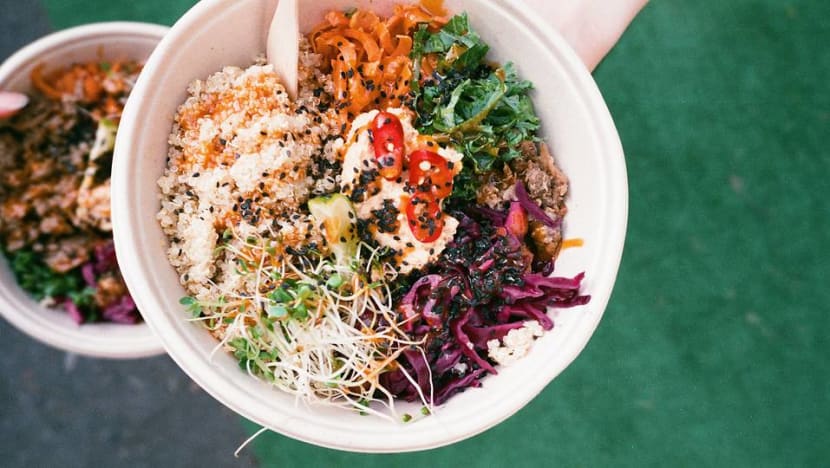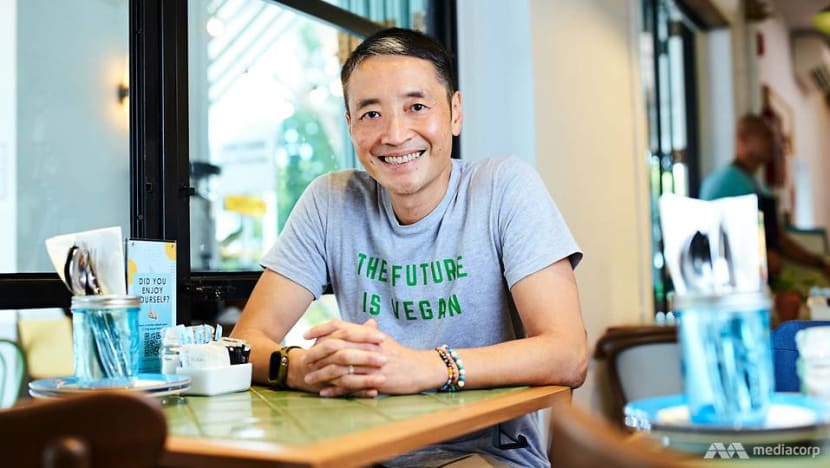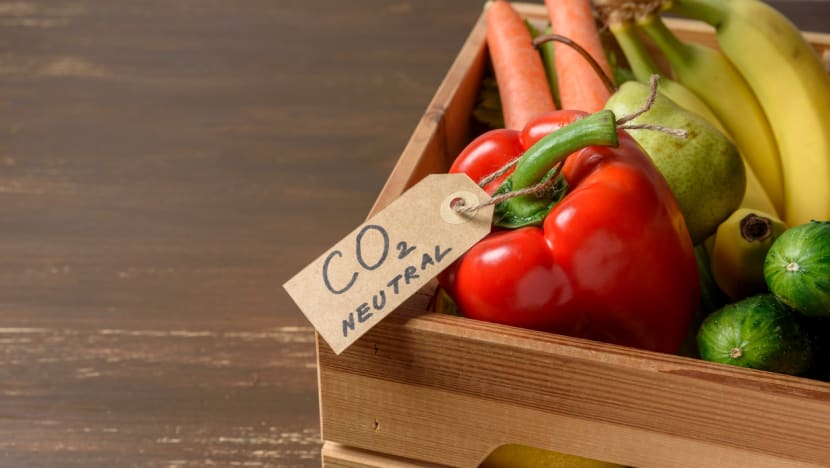Living the plant-based life: Growing appetite for vegan food in Singapore
It's not as hard to adopt a vegan diet now compared to before, with more options, awareness and support, says an organisation that helps people who want to cut back on meat.

SINGAPORE: For years, Mr Yuan Oeij considered himself a fan of popular local dishes like chicken rice, bak kut teh and beef hor fun.
But these dishes don’t appeal to him anymore. The owner of restaurant chain Prive Group completely stopped eating meat and animal-derived products in 2019 and has not looked back since.
His journey was a gradual one. He first considered opting for a vegan diet 10 years ago when he learnt of the cruelty involved in the production of meat, Mr Oeij said.
“It was only 2018 that I finally decided to take steps towards matching my habits with my beliefs, which were incongruent for quite a while,” he told CNA.
He went about it one food category at a time, first removing mammals and dairy from his diet, then chicken and eggs, then seafood.
Now, when he needs a taste of the past, he whips up a plant-based equivalent or has a meal at his restaurants, where he introduced a vegan-friendly menu in 2015.
But he doesn’t miss the actual meat-laden dishes anymore, as it is not in his psyche to want to eat meat, said Mr Oeij.
“You don’t focus on what you’ve lost. You focus on what you’ve gained,” he said, adding that he now finds he has more energy, falls sick less and is happier.
Mr Oeij is part of a growing group of people in Singapore who are ditching animal meat and products.

MORE OPTING FOR PLANT-BASED FOOD
In the last few years, more people are trying plant-based food and cutting down on their meat intake, said Ms Bianca Polak, secretary at the Centre for a Responsible Future.
“More people are becoming aware of veganism and the benefits of a plant-based diet and lifestyle on the environment, health and animals,” she said.
The Singapore-based centre, a non-profit organisation set up in 1999, promotes plant-based food with an aim of supporting people who want to change their eating habits.
Among the reasons behind the shift towards a vegan diet is an increased awareness of how the meat industry contributes to the “destruction” of the planet, she said.
“There is also more awareness of the cruelty in the meat and dairy industry as well as the seafood industry.”
The younger generation is especially affected by this and many decide to adopt a vegan diet after watching documentaries, she said.
The growing market for plant-based alternatives can be seen in the expansion of Impossible Foods, which sells products like “beef” and “pork” made with plant-based products.
Its products are now sold in more than 700 restaurants in Singapore, an almost 300 per cent growth since January 2020, said Mr Laurent Stevenart, the firm’s general manager for Singapore and the United Arab Emirates.
According to numbers published by abillion, a Singapore-based app which members can use to discover vegan food and vegan and cruelty-free products, the average number of vegan dishes per restaurant here rose from 2.3 in the second quarter of 2019 to 4.3 in the second quarter of 2020.
While access and price may have been barriers for people turning to the diet in the past, it is not difficult anymore to adopt a vegan diet in Singapore, said Ms Polak, a vegan herself.
There are communities on social media for support, more awareness on the dietary option and more eateries and supermarkets offering plant-based options, she said.
MORE BUSINESSES OFFERING VEGAN FOOD
Among the businesses catering to the increasing number of people looking for alternatives to meat and animal-derived products is Everyday Vegan Grocer.
The supermarket, which also has a deli, opened in November 2020 and currently occupies a two-storey shophouse on Haji Lane.
Owner Amanda Lee said she started it so people could shop for vegan products without having to go through the tedious process of checking ingredients in traditional shops.
Sometimes they may discover a possible animal-based ingredient in the products when they get home from shopping and feel disappointed with themselves, she said.
"That's why most people actually fall off the bandwagon. They feel that there are so many things to think about … it shouldn't be so difficult," she said.
The 34-year-old is familiar with these issues. She started her journey into veganism about 10 years ago, taking two to three years to completely stop eating animal-derived items.
She wanted to give people the kind of access to vegan options and prices that she didn't have during her journey, she said.
For instance, among the offerings at the store are vegan burgers that cost S$5.
“We wanted a food menu that would appeal to everyone taste-wise and price-wise, so everyone can try vegan and choose kindness. Even if it's just one meal a week,” she said.
Big companies have also taken to catering to vegans. Cruise operator Royal Caribbean International and airline Emirates, for instance, offer vegan menus.
In July this year, Emirates started offering vegan options in its inflight menu for outbound flights from Singapore and in August, did the same for inbound flights to Singapore.
“Demand for plant-based food offerings on our airlines has increased significantly in the last decade,” said Mr Rashid Al Ardha, the carrier’s country manager for Singapore and Brunei.
He noted that there is a particular increase in demand during Veganuary, a global movement encouraging a vegan diet that runs in January every year.
In 2021, Emirates served up to 10 per cent more vegan meals across all its flights in January than in other months.
The demand for vegan food on its ships has been increasing, said Royal Caribbean International’s food and beverage director Francis Dias.
It serves about 90 vegan meals a day in the main dining room of Spectrum of the Seas, which is currently home-ported in Singapore. The dining room seats more than 1,800 guests.
In comparison, when the firm first rolled out its vegan offerings in 2019, there were just "a few orders" for vegan dishes in a day, he said.
IS VEGAN FOOD BETTER?
Health-wise, a minimally processed vegan diet is high in fibre from vegetables, whole grains and fruits, and lower in total calories and saturated fat due to the removal of animal fats from the diet, said senior dietician at Mount Elizabeth Hospital Diane Seto.
“As such, a vegan diet is effective in reducing body weight, body mass index and waist circumference in both healthy individuals and individuals with diabetes and heart disease,” she said.
However these health effects are only conferred with a high intake of whole, plant-based foods like vegetables, fruits, whole grains and beans.
“Not all vegan diets are healthy. A vegan diet that includes predominantly processed or deep-fried foods, or is high in fat and refined sugar, is not healthy,” Ms Seto said.
She also cautioned that vegan food can lack key nutrients such as protein, calcium, iron and Vitamin B12.
“This is because many of these nutrients are found primarily or only in animal sources,” she said, giving the example of Vitamin B12 which is found only in foods like egg, dairy, fish and meat.
Proper planning of the diet is essential in ensuring that the diet is nutritionally adequate, balanced and varied.
Omnivorous plant-rich diets such as the Mediterranean diet, flexitarian and pescetarian diets which include moderate amounts of lean animal proteins have similar health benefits to a vegan diet, Ms Seto said.

A Nanyang Technological University professor said people cutting back on meat have a "great impact on mitigating climate change".
“Animal farming, some of it, not all, contribute to greenhouse gas emissions, so if we can do away with animal farming, it’s really beneficial for the environment,” said Professor William Chen, director of the university's Food Science and Technology Programme.
Results from a Singapore-centric study published in 2019 which looked at the environmental impact of food items illustrated the difference between meat and vegetables.
The annual greenhouse gas emissions per capita with carbon dioxide equivalent as a unit of measurement for pork was 266kg, compared to 6kg for leafy vegetables like spinach, lettuce and Chinese cabbage, according to the study commissioned by investment firm Temasek and carried out by the Agency for Science, Technology and Research (A*STAR) and Deloitte.
However, Prof Chen said crop farming is not entirely green as it still relies on land, water and energy for transportation. Subsequent processing of plant-based protein foods to suit consumer demand also needs energy, he added.
Nevertheless, he said: “Having a variety of diet options with more plant-based foods would certainly help to protect the environment.”


















